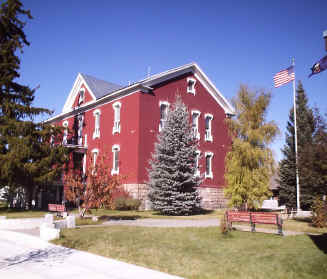DRUG COURT
| Erica De La Rosa Drug Court Court Coordinator 260 4th Ave. N., Ste #B P.O. Box 126 Twin Falls, ID 83303-0126 edelarosa@tfco.org Phone: (208) 735-4361 Fax: (208) 735-4360 |
Sarah Cox Blaine County Drug Court Coordinator Douglas Kramer Judicial Building 201 S. 2nd Ave., Ste #106 Hailey, ID 83338 scox@co.blaine.id.us Phone: (208) 788-5521 x 1045 |
Idaho Drug Court Act:
In 2001, during the first regular session of the fifty-sixth Idaho Legislature, the “Idaho Drug Court Act” was enacted (Chapter 56, Title 19, Idaho Code) to establish drug courts in the district courts of the State of Idaho with the goal of reducing the overcrowding of jails and prisons; reducing alcohol and drug abuse and dependency among criminal and juvenile offenders; holding offenders accountable; reducing recidivism; and promoting effective interaction and use of resources among the courts, justice system personnel, and community agencies. Under this Act, a drug court coordinating committee established by the Supreme Court is charged with the responsibility to devise a drug court implementation plan and oversee ongoing Drug Court programs. The Legislature also gave the Supreme Court the responsibility to administer, allocate, and apportion all appropriations from the legislature for Drug Courts.
Drug Court Schedule:
|
Blaine: |
Burley: |
|
Jerome: |
Twin Falls: |
Drug Testing:
| Drug Court requires random testing on all clients during the entire program. Testing will be on a random basis any day of the week including weekends and holidays. Testing is provided in Twin Falls, Mini-Cassia, Jerome and Hailey. Clients must call the UA line every morning to find out if their phase is being tested. When they call, a recorded message will provide the testing information for that day. Listen to the complete message. The testing schedule below can be increased at any given time as decided by the Drug Court Team. Disputed drug tests will be sent to a certified toxicology lab for confirmation at the participant’s expense. | |
|
Blaine: |
Mini-Cassia: Wienhoff Drug Testing 1253 E. Oakley Ave. Burley, ID 83318 Testing Line Ph# 208-486-9895 |
|
Jerome:
|
Twin Falls: Twin Falls County Treatment and Recovery Clinic (T.A.R.C.) 630 Addison Avenue West Twin Falls, ID 83301 Testing Line Ph# 208-486-9895 |
|
Phase 1– Random testing an average of twice per week or as specified. |
|
What is Drug Court?:
Drug Court was designed to stop substance abuse and the resulting related criminal activity. The Court offers a choice for individuals whose criminal justice involvement stems from their substance use by providing the opportunity to receive treatment. The Drug Court Team consists of the District Drug Court Judge, the Drug Court Coordinator, Substance Abuse Treatment Provider, Prosecuting Attorney, Defense Council, Probation Officer, Law Enforcement Officer, Mental Health Counselor and Vocational Rehabilitation Counselor. The team meets weekly to staff the progress of each client and to discuss their individualized goals. Participants are held accountable for their behaviors and actions and are required to develop and maintain a productive, drug free lifestyle.
When did each Drug Court program start?
- Blaine: July 2007
- Jerome: July 2012
- Mini-Cassia: August 2001
- Twin Falls: September 2001
Drug Courts rely upon frequent judicial oversight, intensive supervision, intensive substance abuse treatment as well as a variety of incentives and sanctions to response to participant progress. Drug Court provides comprehensive hands-on supervision and monitoring and requires the participant to have far more contact with the judicial system than any other case management approach. In addition, the program offers educational development, vocational development, helps teach the participant life skills, parenting/family skills, anger management, trauma counseling, couples counseling and encourages participation in community support meetings. The Drug Courts team expects to see positive changes in the client’s life as a result of this program. It is our belief that if the client trusts the process and puts forth an honest effort, they will remain sober, have improved health, a more stable lifestyle, obtain or improve employment, further their education, develop healthy relationships and become a productive member of society.
Who is involved in the Drug Court Team?
The Drug Court Team consists of the following representatives:
-
- Judge and support staff;
- District Attorney;
- Public Defender;
- State and local law enforcement agencies;
- Mental Health Clinician
- Treatment Providers
- Felony Probation & Parole
Who is eligible for entry into Drug Court?
To be eligible person for Drug Court, a person must:
- Be 18 years of age or older.
- Be charged with a qualifying felony criminal offense.
- Not have a prior felony criminal history involving sexual assault.
- Have a qualifying substance use disorder and meet the recommendation for treatment.
- Have reliable transportation.
- Pled guilty to charges as agreed upon by the Prosecuting Attorney and the Defense Attorney.
- Not be suffering from any condition that could prevent or restrict the person’s active participation in the Drug Court program.
- Crimes of violence and/or crimes in which a weapon was used are subject to prosecutor consent as specified in Idaho Code 19-5604 as amended in 2011.
The Drug Court Program carefully screens each case to determine eligibility for services.
If an offender is not accepted into the Drug Court Program their case will return back to their original judge for further proceedings.
How long does Drug Court last and what are the services provided?
The Drug Court program length is determined by the participant’s progress, but is a minimum of 12 months and consists of:
- Regular judicial contact
- Substance Abuse Treatment
- Intensive case management; community supervision; counseling and support
- Referrals for a range of support services including housing, education, vocation training, employment and specialized counseling
- Randomized, viewed drug testing
- Rewards and sanctions are used to compel compliance with the program.
What kind of behavior would result in sanctions?
- Dishonesty;
- Ingesting illegal drugs; consumption of alcohol;
- Committing new criminal offenses;
- Failure to comply with any drug court requirements;
- Violence and/or threats of any kind;
- Sexual behavior and/or harassment;
- Absconding/avoiding supervision;
- Threats/risks to public safety;
What happens if the individual disobeys the conditions of the Drug Court program?
The Drug Court can apply sanctions including but not limited to: increased court appearances, curfew modification, written essays, community service, work detail, jail and termination.
What happens if the individual is discharged from the program?
The individual will go before their original judge where the suspension of the original sentence maybe imposed.
What if the individual successfully completes the program?
Upon successful completion of treatment, the defendant will graduate from the program and return back to supervision under Felony Probation and Parole to complete their probation. Drug Court graduates may petition the Drug Court Judge and request that their felony case be dismissed and/or amended per Idaho Code 19-2604.
How to apply:
Step 1: The defendant must enter a guilty plea. Defendants that enter an Alford Plea or that are found guilty at jury trial- are NOT eligible for Drug Court.
Step 2: The Drug Court referral and contract are entered with the presiding judge’s court clerk (see Drug Court Referral and Contract links below).
Step 3: The court clerk enters a register of actions into Odyssey and all parties are notified of the pending Drug Court application.
Step 4: The Drug Court coordinator makes contact with the defendant to complete the drug court application (see Felony Drug Court Application link below), then directs the treatment provider to begin the GAIN evaluation and the probation department to begin the LSI-R evaluation process.
Step 5: Determination of Drug Court eligibility is completed within 4-8 weeks. If the applicant meets the eligibility criteria, a Notice of Drug Court Eligibility is filed with the sentencing court. If the applicant does NOT meet the eligibility criteria, a Drug Court Transfer Order is filed with the sentencing court.
Step 6: At Sentencing/Disposition, the sentencing court may order the defendant to participate and successfully completed drug court as a term and condition of their probation; or sentence the defendant to a Retained Jurisdiction Program; or may sentence the defendant to prison.
Drug Court documents:
- Treatment Court Intake Form (12-23)
- Twin Falls County Drug Court Referral (12-22)
- Mini-Cassia County Drug Court Referral (12-22)
- Jerome County Drug Court Referral (12-22)
- Blaine County Referral Form (06-23)
- 5th Judicial District Drug Court Contract 05-17
- LSI Questionnaire
Policy Manual:
Treatment:
The 5th District Drug Court currently partners with several Substance Abuse Treatment Providers. Offices are located throughout the Twin Falls, Jerome, Burley and Blaine County areas.
Upon initial application to Drug Court, participants will be assigned to a provider for an evaluation. Based on the assessment recommendations a treatment provider will be assigned that meets the needs of that client.
For questions regarding this information please contact Israel Enriquez or the Drug Court office at 736-4122.
Treatment:
The 5th Judicial District Drug Court currently partners with several Substance Abuse Treatment Providers. Offices are located throughout the Twin Falls, Jerome, Mini-Cassia and Blaine County areas.
Upon initial application to Drug Court, participants will be assigned to a provider for an evaluation. Based on the assessment recommendations, a Treatment Provider will be assigned that meets the needs of that client.
For questions, regarding this information, please contact Israel Enriquez at #208-736-4122.
Community Partnerships:
The Fifth Judicial District Drug Court together with community businesses, organizations and citizens offer various services to build positive partnerships within the community.
-
- Employment
- Drug Court clients are very skilled and have many talents and abilities to bring to the workforce. Clients are closely monitored for drug usage, inappropriate behavior, attendance, honesty and open communication. Drug Court partners with these companies to resolve problems that may arise with drug court participants. When coupled with good businesses that communicate with the court system, these employees become dedicated and valuable members of the community’s work force.
- Employment
-
- Community Service
- Non-profit organizations
- Community Service can be issued as a sanction to Drug Court participants. Participants must pay a fee that covers Workman’s Comp. Insurance for protection of both the participant and the entity receiving the service. By doing community service, this helps the individual repay their debt to society.
- Non-profit organizations
- Community Service
Donations:
Incentives are directly linked to the willingness of the individual to participate in their treatment plan. Special efforts and milestones within the program are recognized. Incentives are awarded for phase completion and for exceeding Drug Court expectations. Tickets for movies, community events and food are also awarded to acknowledge the clients accomplishments.
Donations/Contributions are coordinated by the District Drug Court Coordinator, Israel Enriquez, (208) 736-4122.
Court Locations:
BLAINE:

Blaine County Courthouse
206 1st Ave. South
Hailey, ID 83333-8429
Blaine County Drug Court is held every Thurs. at 4:00 pm.
Open to the Public.
BURLEY:

Cassia County Courthouse
1559 Overland Ave.
Burley, ID 83338
Mini-Cassia Drug Court is held every Thurs. at 4:00 pm
2nd Floor – District Courtroom.
Open to the Public.
JEROME:

Jerome County Judicial Annex
233 W Main Street
Jerome, ID 83338
Jerome County Drug Court is held every Tues at 4:00 pm.
Open to the Public.
TWIN FALLS:
![009[1]](http://www.5thjudicialdistrict.com/wp-content/uploads/problem-solving-court/drug-court/court-locations/0091-250x193.jpg)
Theron W. Ward Judicial Building
427 Shoshone Street North
Twin Falls, ID 83301
Twin Falls Drug Court is held every Wed at 4:00 pm.
Open to the Public.
Court Appearances:
Phase I – Appearance required every week unless otherwise specified.
Phase II – Appearance required every other week unless otherwise specified.
Phase III & IV – Appearance required every third week unless otherwise specified.
Drug Court and Mental Health Court Coordinators Roster (03-23)
 5th Judicial District
5th Judicial District